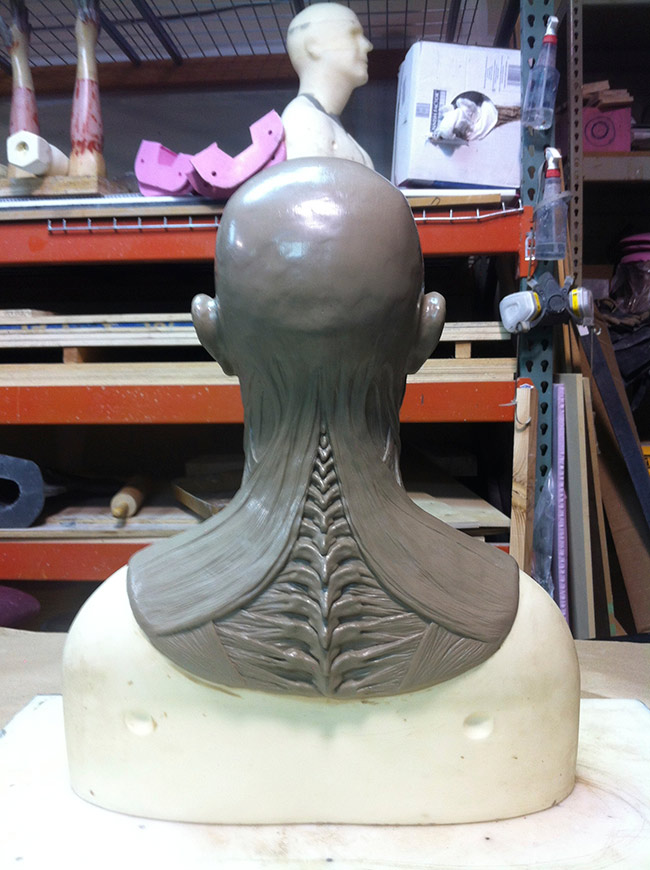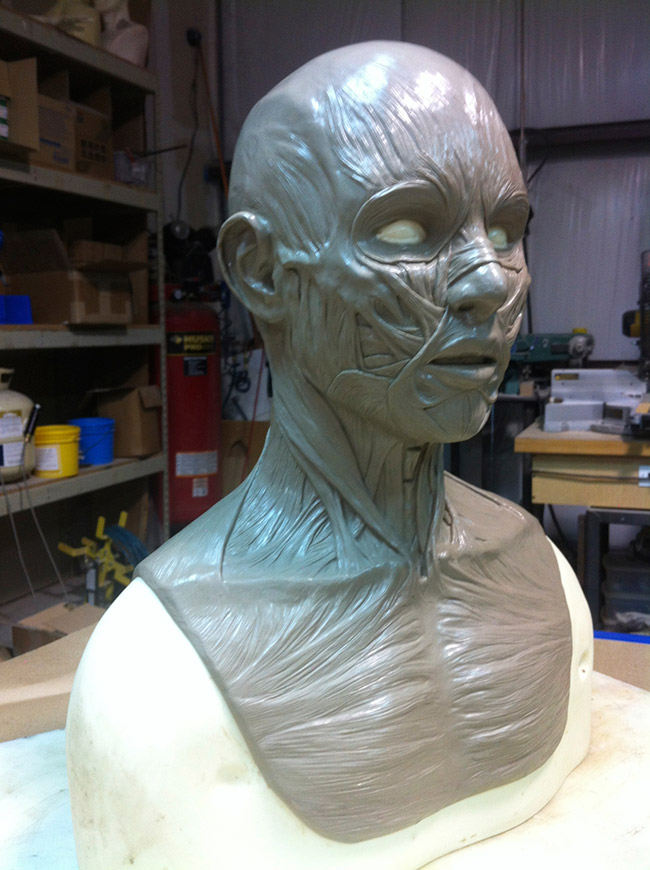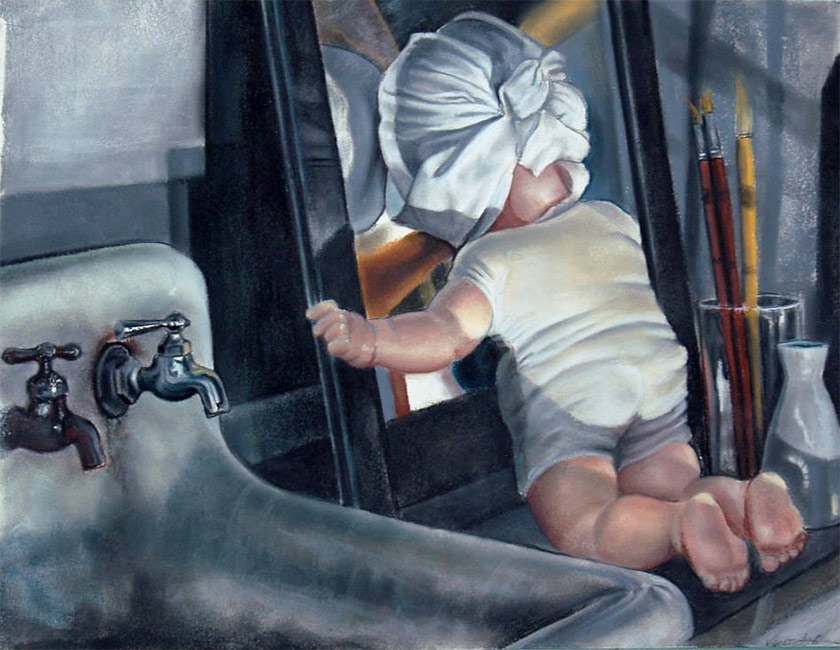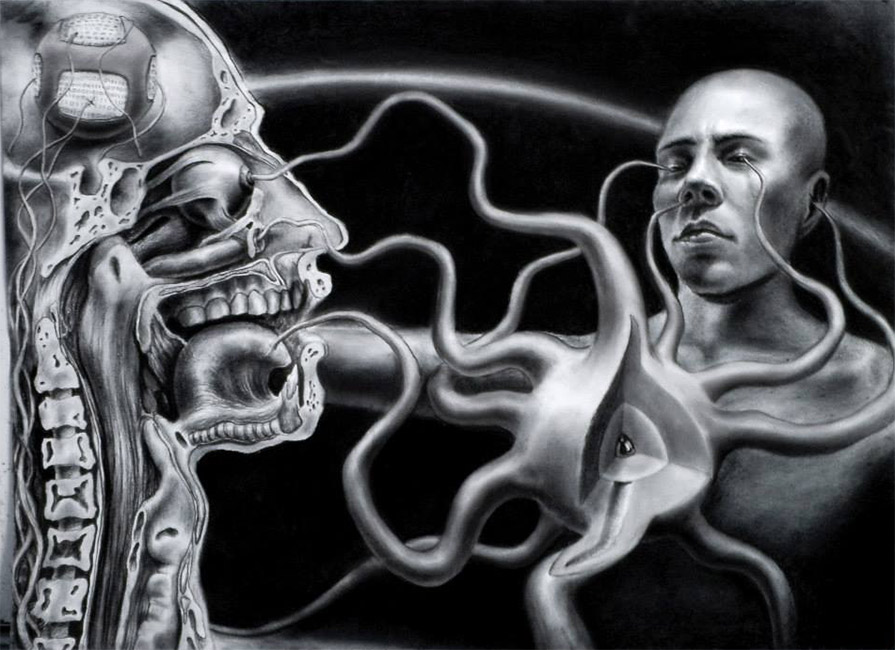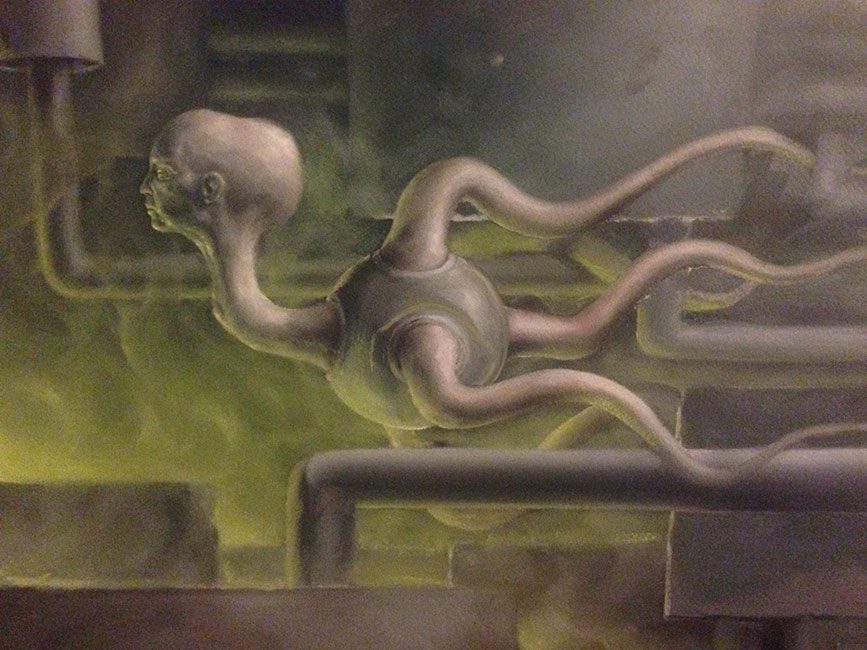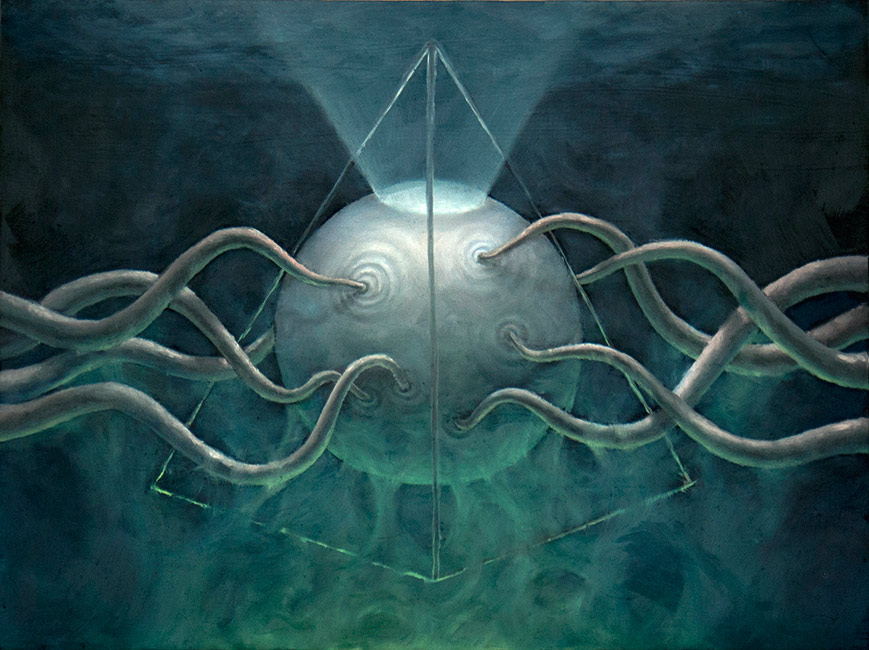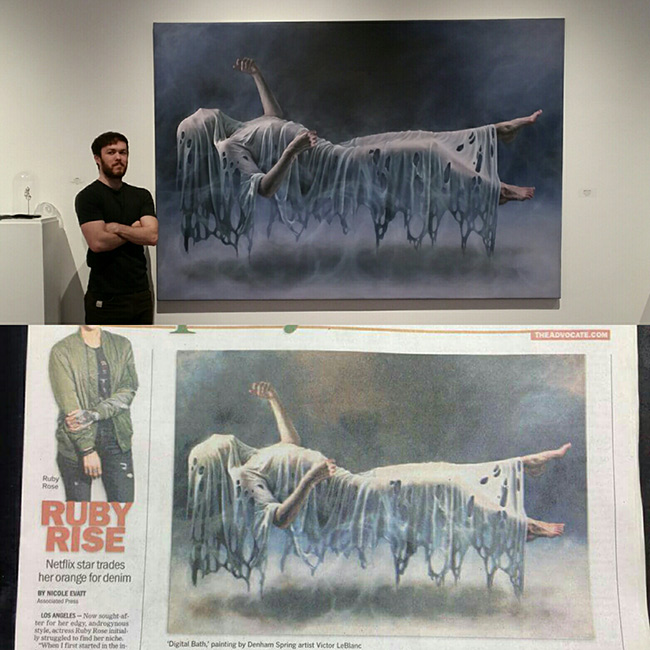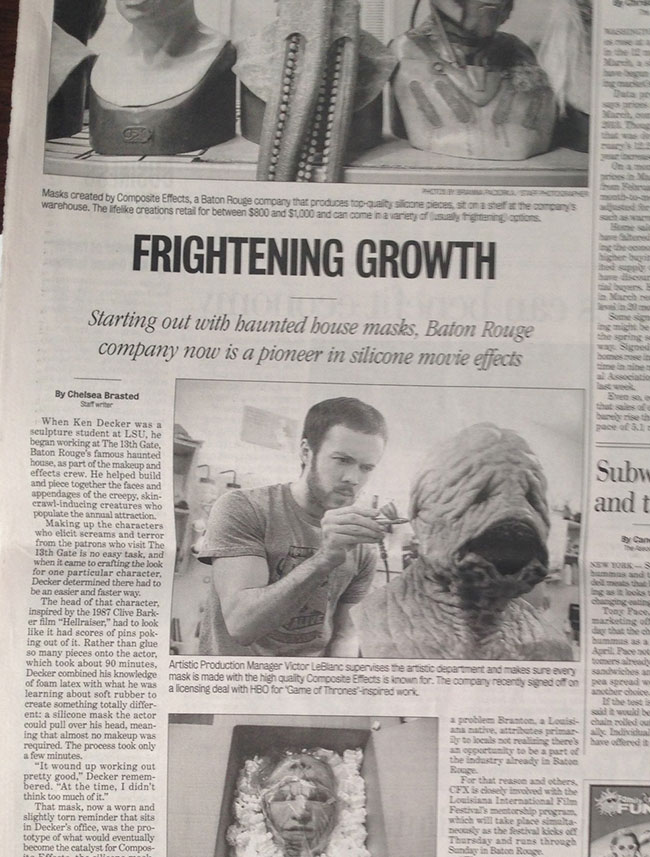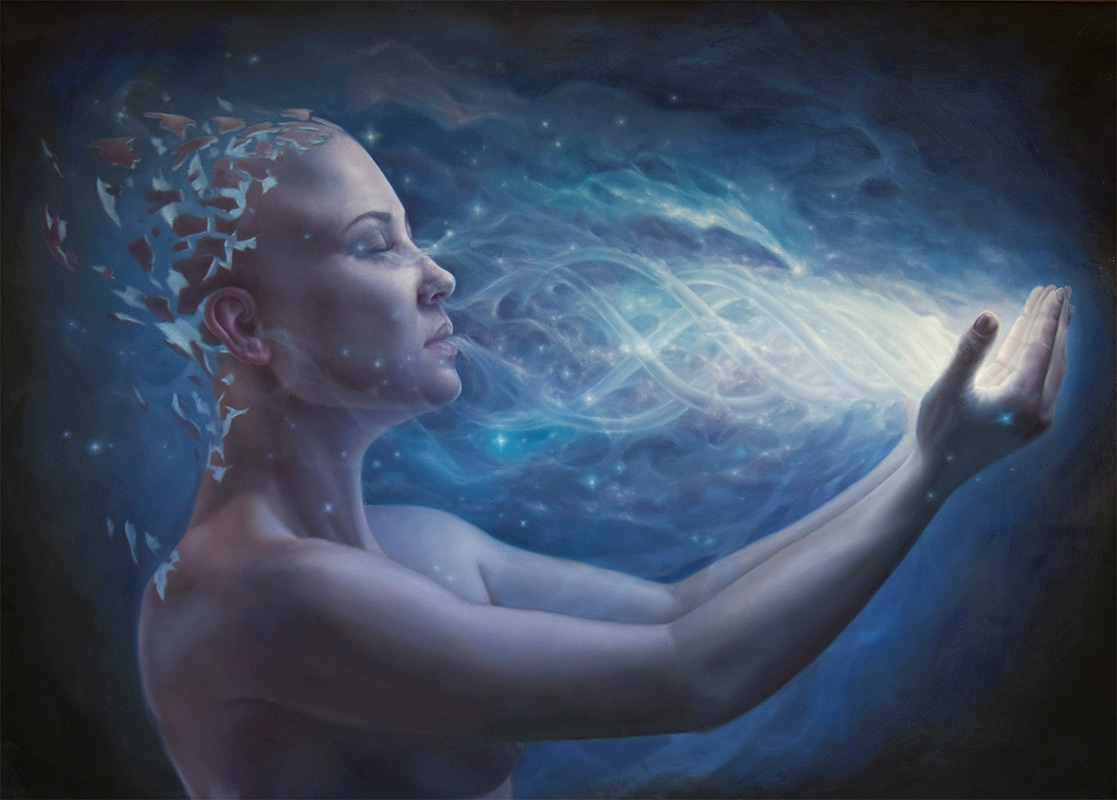The world that Victor LeBlanc contemplates and shares with us in his masterful paintings, provides an unnerving glimpse into an all too possible future, where humankind has continued down our seemingly inevitable path of shaping both ourselves and our surroundings through the development of ever pervasive technologies. LeBlanc envisions us submerged in a reality of our own construction; a synthetic existence which replaces our connections with the physical world around us. He explores the possibilities of an evolved human experience, that bypasses the limitations of the corporeal and allows us to play out our dreams in a virtual mindscape. These visions of an immersive technological future are made all the more potent by means of LeBlanc’s meticulous realism, which is suggestive of the tempting realism that may turn our technological advances into seductive portals for our consciousness. As the old saying goes: be careful what you wish for.
Victor LeBlanc is originally from San Francisco, California, and is currently living and working in Baton Rouge, Louisiana. He graduated from Louisiana State University with a degree in painting and drawing and upon graduating started working in the Special FX industry. Recently, Victor made the decision to return to painting on a full-time basis.
WOW x WOW couldn’t be more delighted that Victor has contributed two brand new paintings to our ‘Room of a Thousand Doors’ group show. The pieces, ‘Life (Through the Screen)’ and ‘Post Human’ are both utterly epic in scope and vision. We wanted to learn more about the artist behind these works so we posed a few searching questions to Victor. We hope that you enjoy the following exclusive in-depth interview.
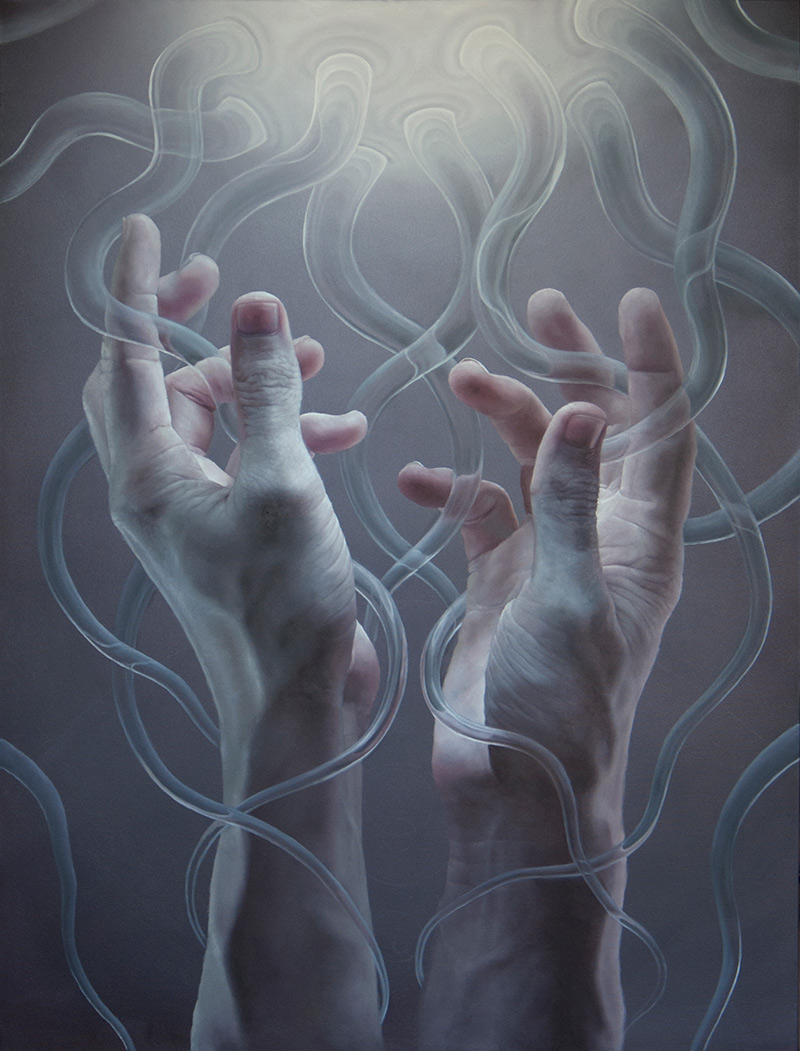
Hi Victor, thanks very much for making the time to have a chat, we really appreciate it. To get us started, can you talk to us about growing up. In what ways did your childhood and upbringing affect your relationship with the arts?
My childhood years were spent in San Francisco around the lower sunset district. We lived a fairly modest lifestyle; my parents, sister and I, all in a one-bedroom apartment. My parents took great care of us and were very encouraging, but we didn’t have much growing up (not many toys or luxuries, no video games or cable T.V.), but I think in many ways lack of materialism has a positive effect on nourishing creativity. My friends and I would ‘invent’ things and come up with games. The apartment building and surrounding areas would serve as the framework for our imagination.
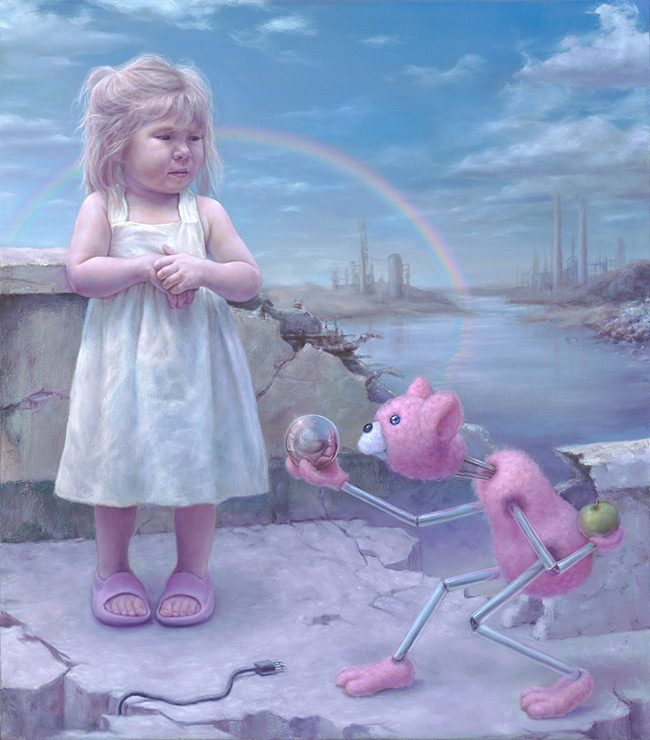
I never actually took much interest in fine art when I was a kid. I was always much more into the logical and scientific ways of thinking. However, I did feel a general creative drive. My first inspirations into my own artistic ideas came from comedy and animated shows like the Simpsons, Futurama, and particularly the surreal aesthetics of claymation and stop-motion found in Wallace and Gromit, and Tim Burton films. Think it was the junction of real-life objects moving in and artificial way that gave stop-motion films such an other-worldly quality, which captivated my curiosity.
My first creative endeavors took the form of cartoons and character sculptures done with Sculpey clay. I do always remember feeling compelled to create something of my own right after being inspired. I actually made a couple claymation shorts as a take on school projects (nothing fancy). They were done very crudely, with a home video camera, where each frame was taken by turning the camera on and off really fast. I also made a little cartoon strip for a while. I just liked making things. Bringing ideas to life was what fascinated me.
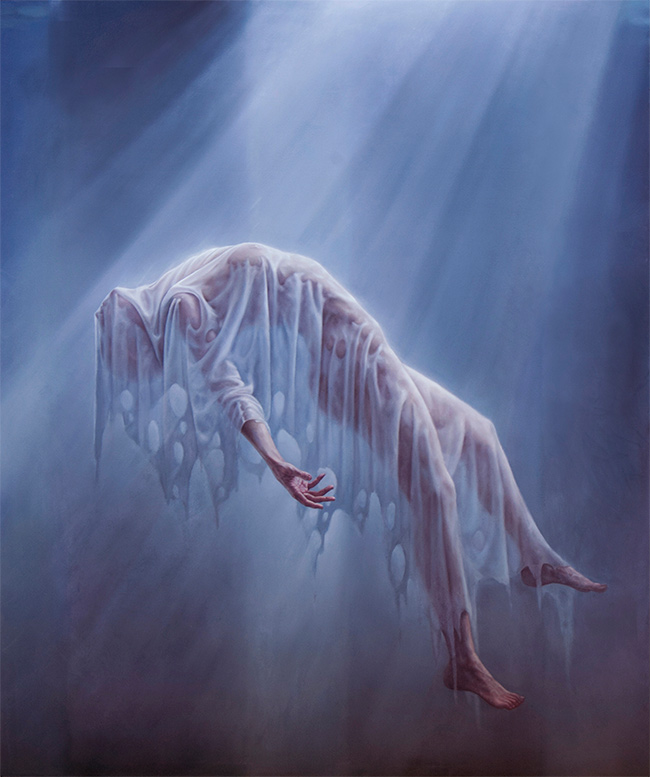
In my early teens, my family moved across the country from San Francisco, to a small town outside of Baton Rouge, Louisiana. I did experience some culture-shock and maybe some teen angst. I also started getting into music. My first intrigue into fine art actually came from the album artwork of various bands. I loved looking through album sleeves. I liked that there was a visual accompaniment to the music. Artist like Alex Grey, Helnwein Gottfried, and H.R Geiger were big early influences. I also took inspiration from artistically produced music videos, particularly the music videos of Tool, made by Adam Jones, which incorporated a lot of stop-motion animation. I remember wanting to make music videos or films or paintings. I was always more interested the visual idea and not so much specifically on the medium. Learning the craft of painting and sculpting was just a means to getting ideas out there. I later grew to appreciate the artistic process in and of itself. It wasn’t until the middle of high school that I started drawing anything realistic.
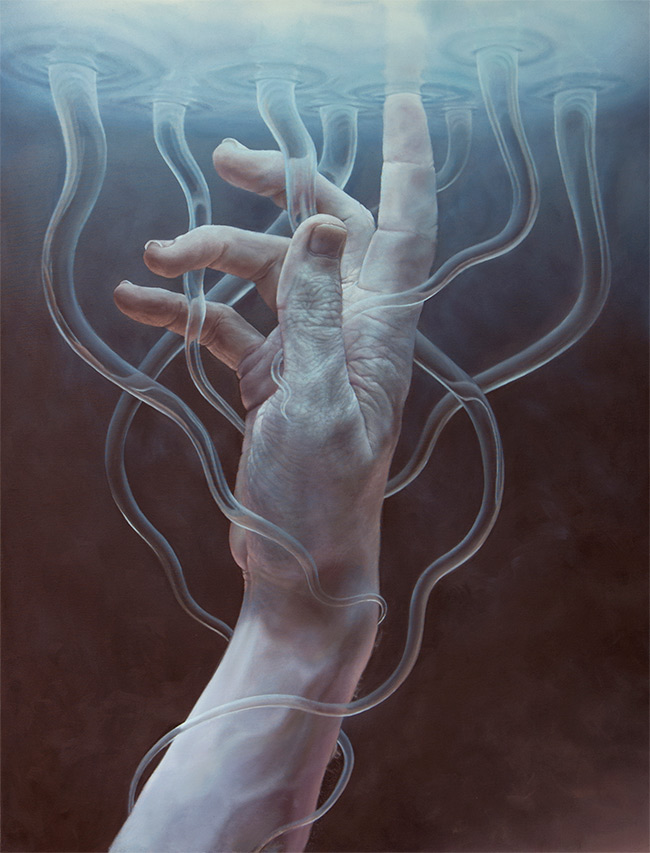
Having worked within the Special FX industry, can you give us a little insight into your roles and experiences? What kind of impact have they had on your personal work?
I started working in the FX industry directly after I graduated LSU with a degree in painting and drawing. It was more of an opportunity to make a consistent paycheck, and ironically, my paintings and personal artwork that I went to school for took a back seat during the time I was in Special FX. I started out as a painter (airbrush painting silicone masks and props). Painting 3D objects is a completely different concept than painting on a 2D canvas. The idea is to create illusions of surface texture, translucency, subtle depth, etc. that allude to certain physical properties of an object that already exists in space. I eventually started sculpting, and after a couple years in the studio, I started running the painting department at CFX.
![]()
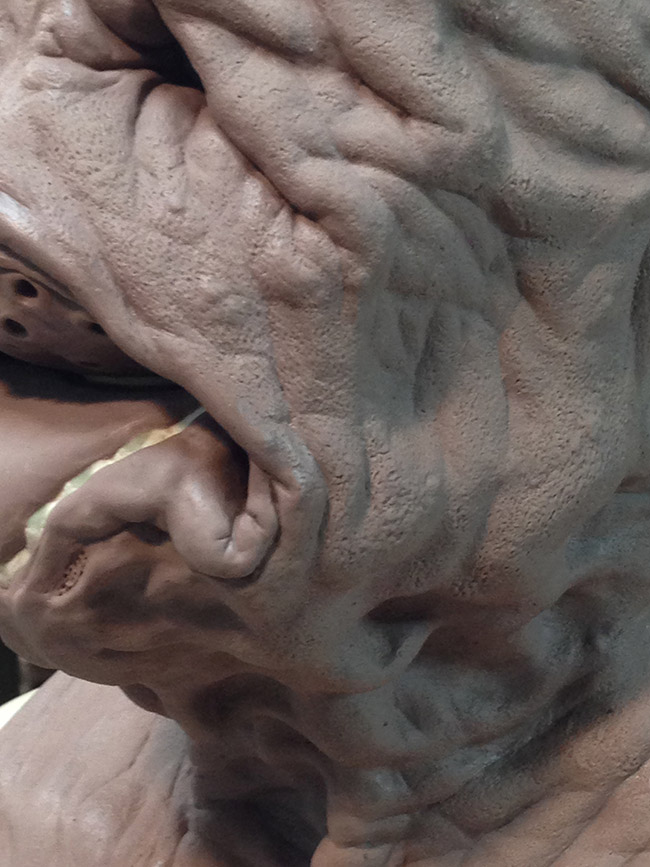
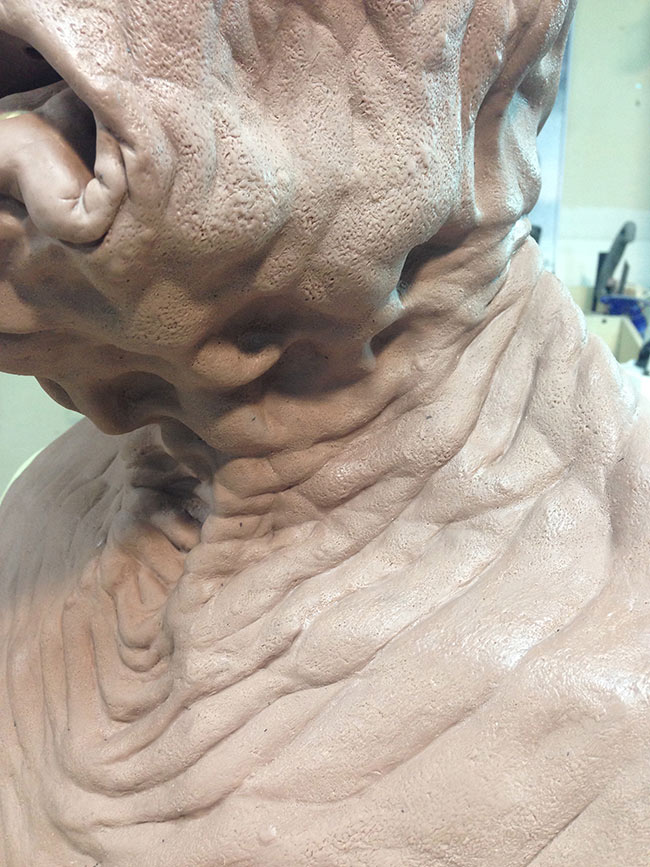
Working in a more business-oriented artistic industry has its ups and downs. It can feel like factory work sometimes, it can be a little creatively limiting (as all commission work can tend to be), but it can teach certain lessons not emphasized in other artistic fields. Some things you learn in the FX industry: 1) How to work efficiently and think logistically (there is a balance between taking time with the creative process, and being mindful of developing your skills in a way that is as efficient as possible. Time is valuable). 2) How to appreciate and experiment with a wide variety of materials in a functional way. 3) Understanding the visual concepts behind physical properties (what makes skin, or stone, or ice look the way it does). 4) How to teach others. One of the most valuable experiences from the FX industry came from managing, training and being in charge of the visual quality coming from a team of different artists that all learn in different ways. I encourage anyone in the arts to, at some point, take the opportunity to teach your craft. There is something that happens when you have to explain the method to your madness. Art can be such an intuitive process, and as much as we think we understand what we are doing, its not until we begin to explain what we are doing, that we realize there are a lot of pages missing from our mental instruction manual. The teaching process allowed me to recognize the parts of my technique that were vague or intuitive, re-think them, and refine them in a way that I wouldn’t get if I wasn’t forced to examine and explain every detail of my process and the concepts behind them.
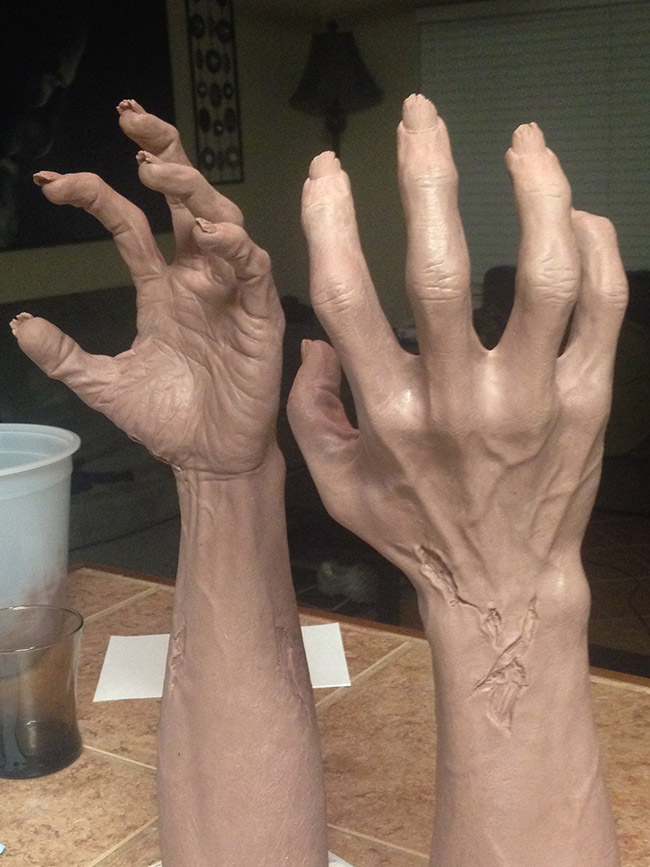
![]()
![]()
Your paintings are realized with a tremendous vision and skill. There is a great realism within the fantastic. How do you go about constructing an image? What sort of reference do you gather, and what amount of research do you undertake in before you pick up a paint brush? How do you approach the creative process?
All of my concepts start with an internal visual. I try to get a clear mental concept and then jot it down in my sketchbook. My sketchbooks are admittedly not very detailed. I tend to just get down enough so that I can remember the idea for later use. Once I decide to take a sketch to the canvas, I’ll start on a more detail sketch and start putting together reference images and studying the visual concepts behind elements of the composition.
Photography is a skill I’m still working on. I think about lighting a lot. If there is a figure, I’ll get a model to pose. I’ll occasionally set up dioramas for environment reference. Although reference images are a great tool, particularly for realism, my goal is always to understand the visual concepts of the image enough to eventually move past the need for it. Once I’ve gathered what I need, I usually do a mock-up painting on a tiny canvas board. Lately, I’ve been working more with Photoshop. Although I’m still learning it, it seems to be a quick easy way to put a few images together and experiment with the composition. Once the idea is ready to go up on a big canvas I’ll usually paint the background/atmospheric elements first, and do the subject or figure on top of that, or lately, I’ve been experimenting with using a Chuck Close style grid system if theres a subject I’m drawing direct reference from. The idea of looking at each section of the image as an abstract painting allows me to get zoned into the tiny details, and I think is a helpful process towards achieving a hyper-realistic painting (although, I would put accurate color mixing and placement at the top of all other priorities).
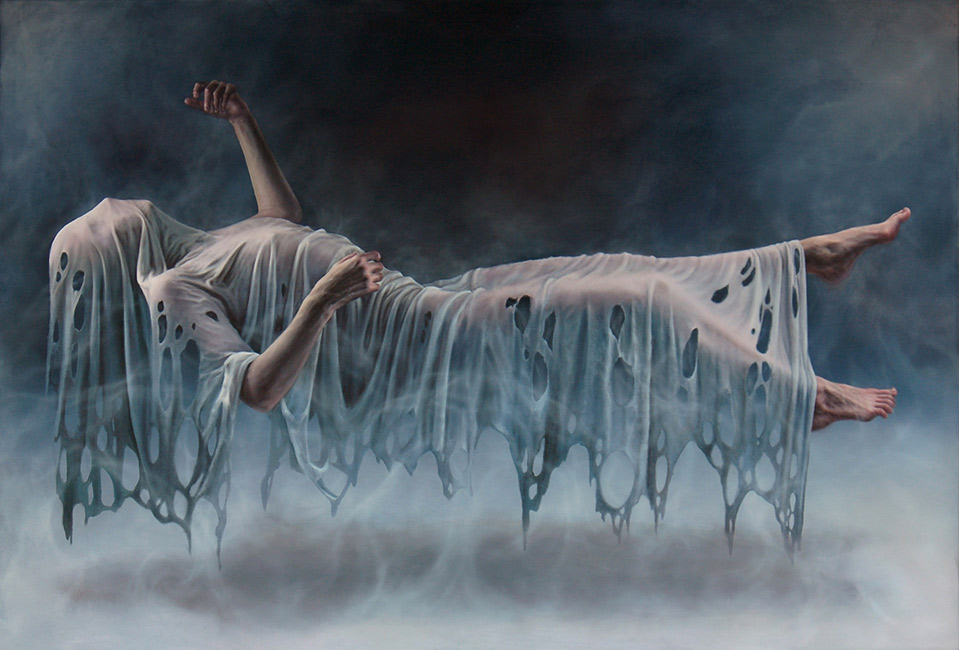
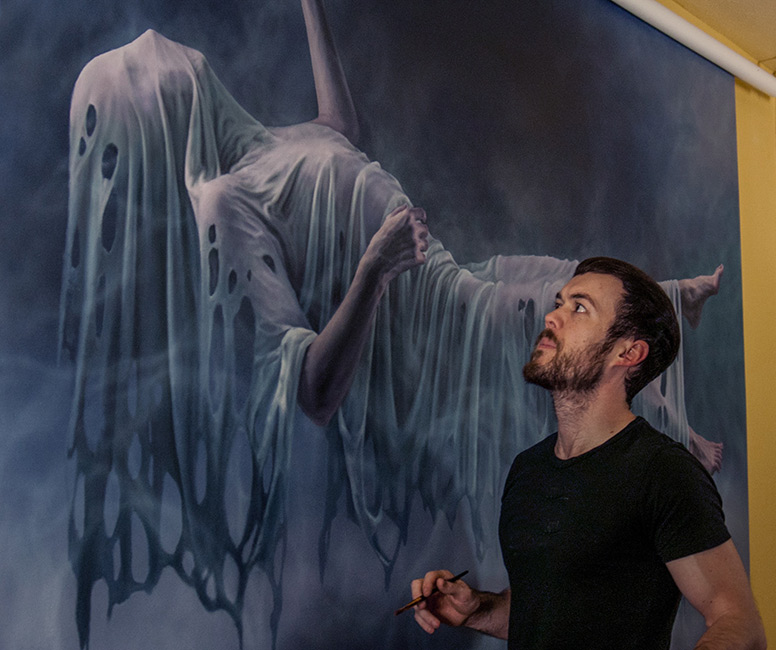
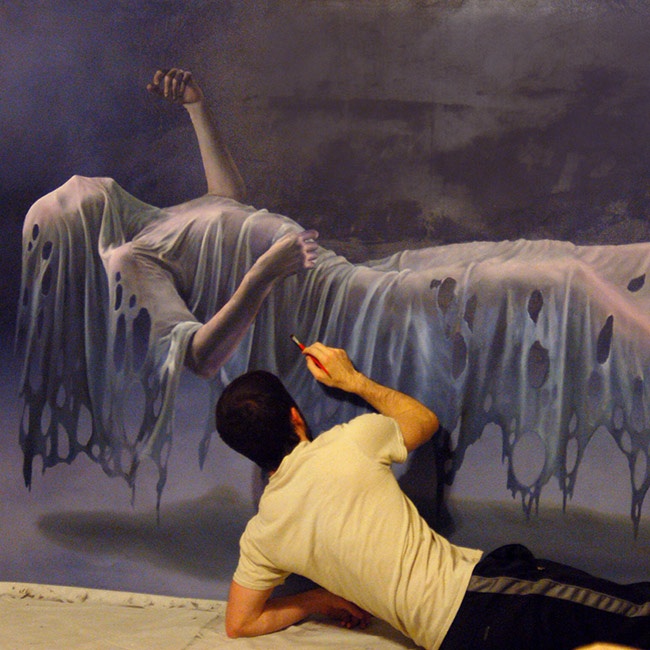
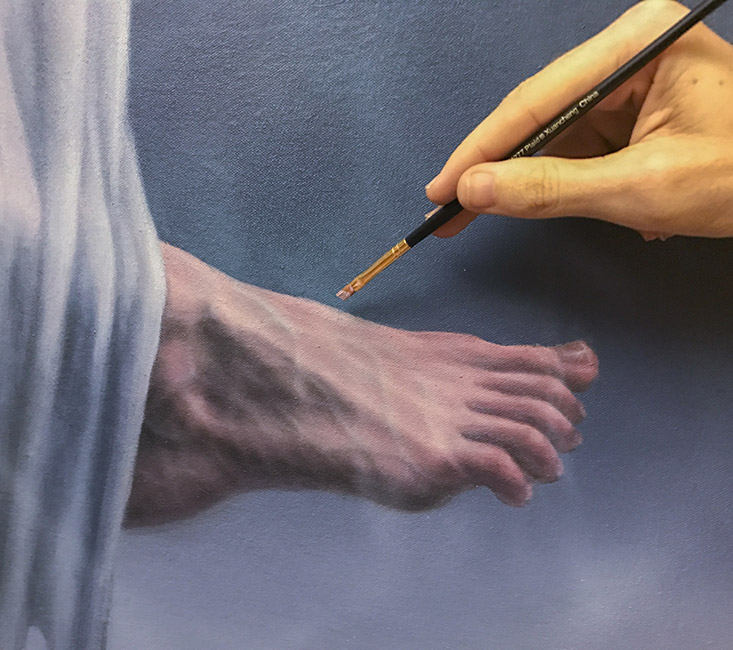
The more large-scale paintings I make, the more I realize how important it is (mainly to avoid wasting time) to have a very clear and well planned out design before I start putting paint down. It’s easy to waste a lot of time fiddling around and adjusting things on such a large canvas. It’s a little weird talking about my artistic process, because I don’t feel like I have one I’m really married to yet. I always feel like I’m still learning. However, I think it’s a good practice to keep searching for new methods of creating and I always feel like there’s a better way I could be doing things. I think if you want to be your best at something, you have to live comfortably with the reality that there is a constant process of critique and improvement involved, and you never really ‘get there’, you only achieve different levels of understanding.
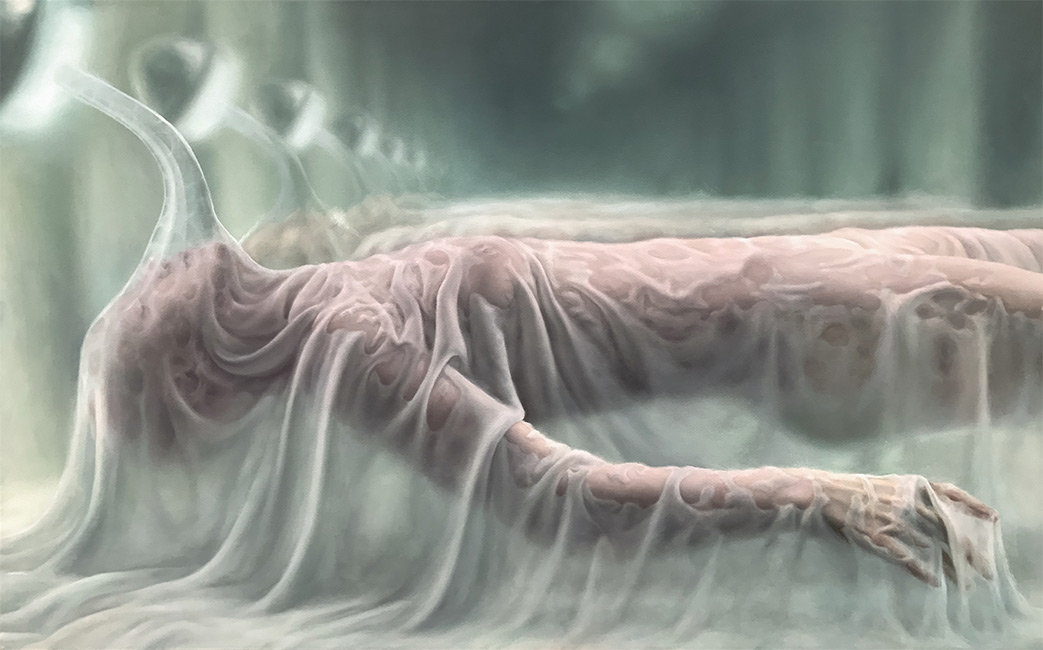
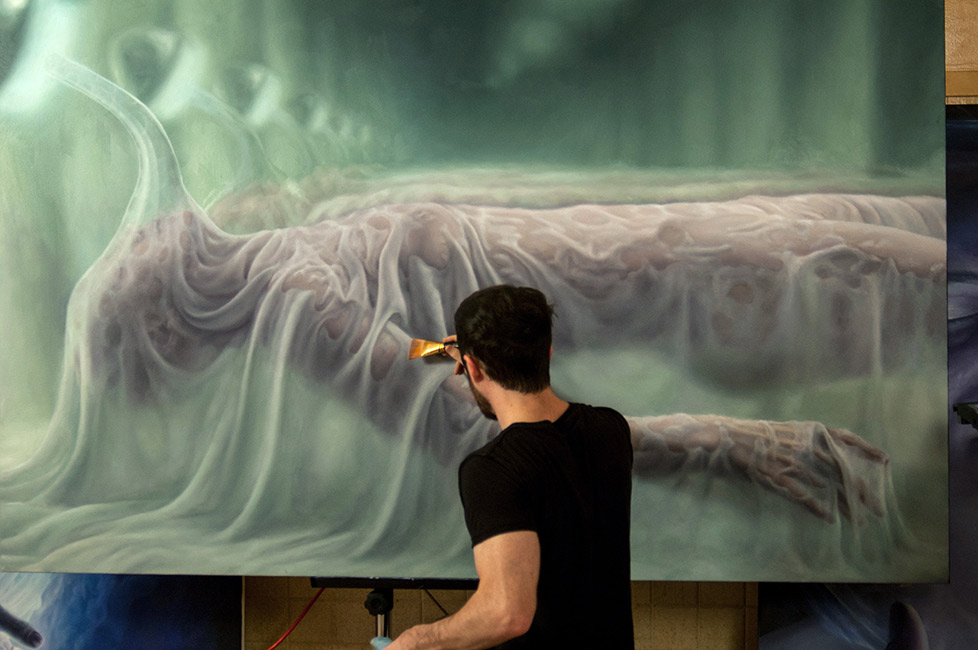
What emphasis do you put on the titles you give your imagery?
I think it’s important, at least for what I do, to stand on the edge of the familiar and the mysterious. That being said, I think the title of a work can give some familiar context to an image that is inherently a little vague on its own or vise versa. The title can help to ground the image to some sort of conceptual foundation, or redirect the apparent intention to something a little less obvious and provoke a deeper consideration of the image.
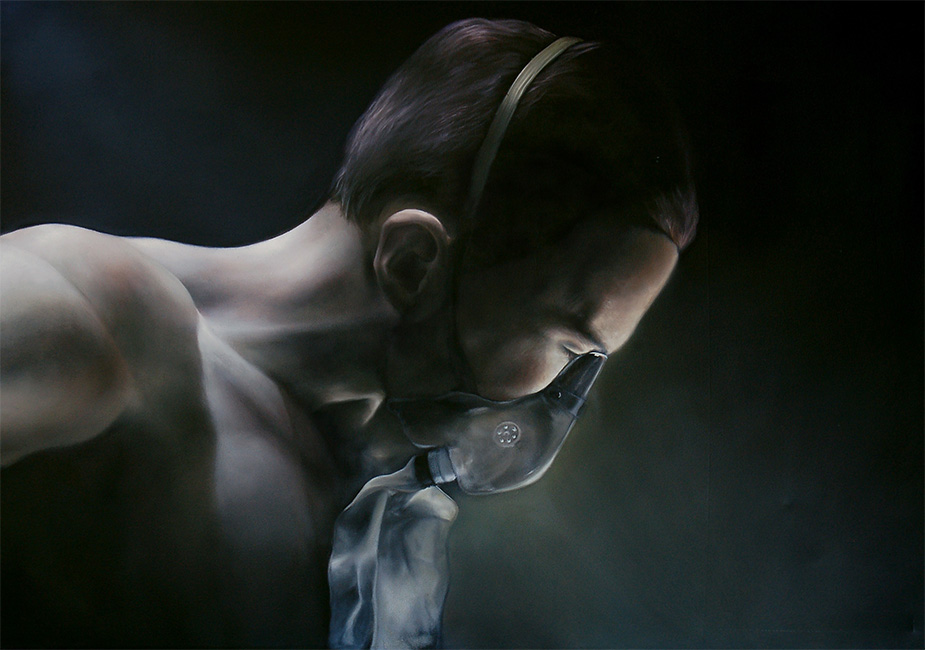
At the core of your inspiration lie fascinating questions about humanity’s preoccupation with technology. We’d love to hear you talk about your hopes and concerns regarding the possible paths this obsession could lead us down.
This is a subject I could spend way too much time talking about, so I’ll try to be as general as possible. I think this phenomenon we are seeing were humanity is becoming increasingly more hypnotized by our ‘devices’ and sucked into online worlds, gives us some profound insight towards the direction we are heading and what may be the end result of all of this. At the moment, it seems the allure comes from the ability to effortlessly communicate, and share and receive information and experiences from everyone and everything around the world. Seeing the mere potential of this, we can understand why it consumes so much of our attention. But what happens when the crude nature of experiencing all of this through a screen, becomes increasingly more immersive? The advancements in VR technology seem to suggest that even more of our attention is yet to be consumed. Many people already periodically opt-out of the physical world and absorb themselves into the greater and more instantaneous stimulation that exists through their devices. So, how will the physical world compare when that synthetic reality becomes increasingly more immersive? Or when it eventually becomes fully immersive? What happens if real world experiences start to look sub-par compared to the limitless potential of virtual experiences? The end of this long road seems to look something like a voluntary version of The Matrix (without the robot armies).
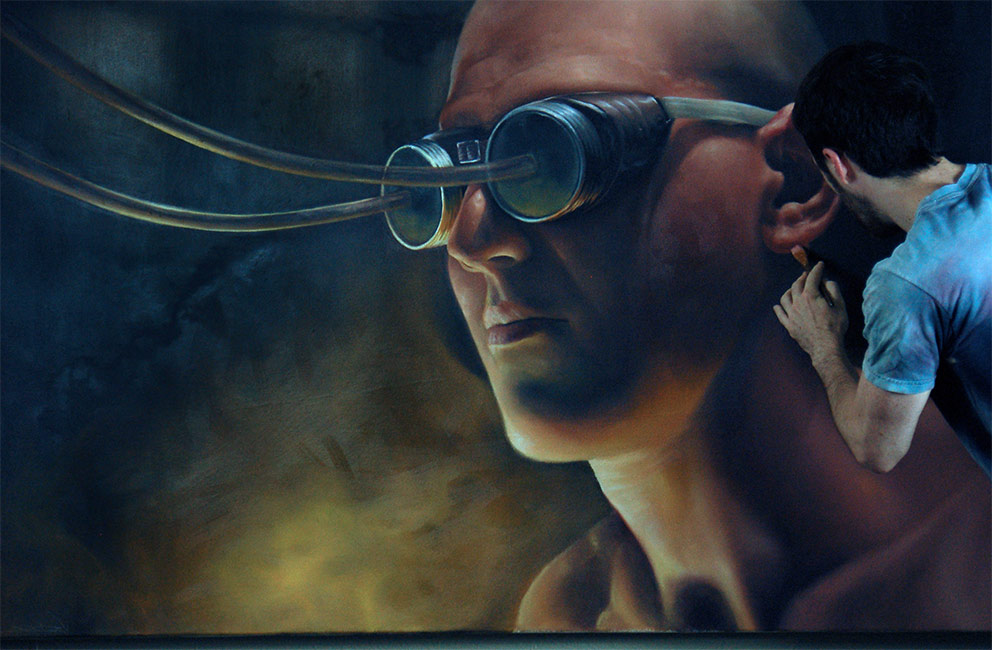
So, if the premise is: we are improving technology to create increasingly realistic virtual worlds, and developing an ever-increasing immersive experience into those worlds, and that this technology will continue to improve; basically, there are two general paths this can lead us down. It could be a soul-draining misstep in our mental evolution, that leaves us fundamentally unfulfilled and disassociated from our identity and connection to each other as human beings, or it could be the gateway to a virtual heaven, where the most engaging, exciting, and fulfilling experiences can literally be programed into an immersive platform. I’m not sure what the result will be, but the trend of altering (writing) our own reality has been the relationship between humans and technology since the advent of language. Our imagination is the underlying code behind the skyscrapers, roads, and flying machines that make up our current environment. We seem to have always had the compulsion to create a world for ourselves. We manipulate our environment far more than any other known life form. It is something uniquely human, and I don’t see this stopping. The digital age just seems to be a monumental stepping stone for this trend to continue at an exponential rate.
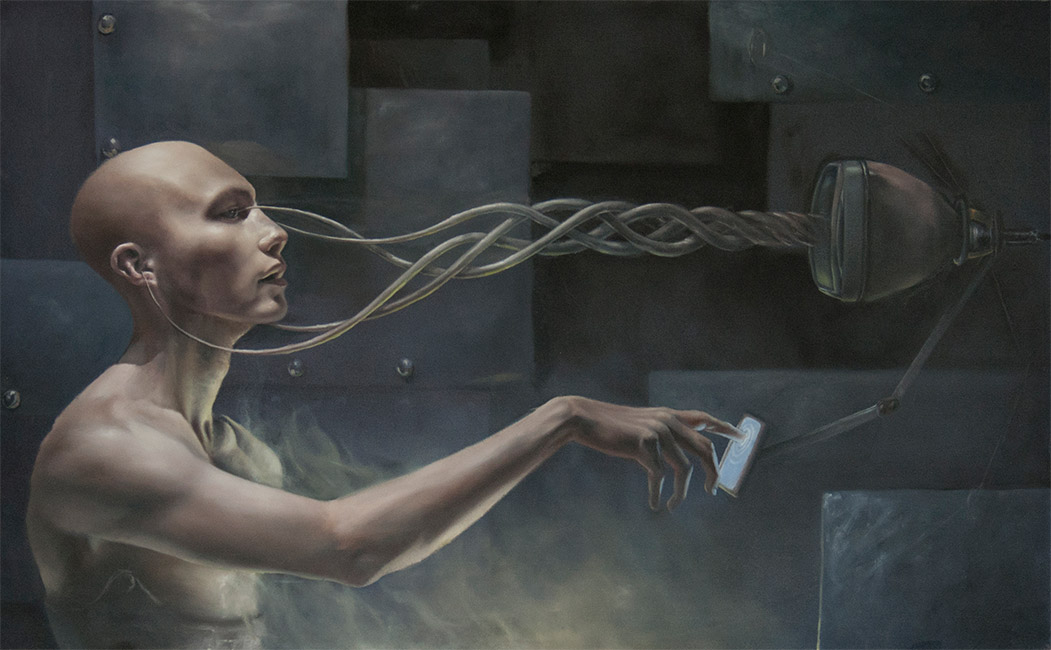
As sad as it seems, it does appear that many of us would rather experience the reality within a tiny screen hovering in front of our face rather than experience the world around us. So what happens when that tiny screen is a fully immersive experience, indistinguishable from the world around us? How could we resist spending the afternoon with our friends by flying off to some mystical alien world, or being kings in a gilded palace with no real ethical concerns, or going on some epic quest, fighting dragons with no consequences of our own mortality? These are the things we have always dreamt about as children. The allure from the legends in movies, novels, and as far back as oral tradition. Being able to live out the vast expanse of the imagination. If virtual technology has the potential to be fully immersive, and fully programable, we have the potential to create the most enriching experiences for ourselves. But, what will that mean for the human spirit? Or the physical body? It’s possible technology may be disintegrating whatever that is. It’s also possible we may be redefining what it is to be human.
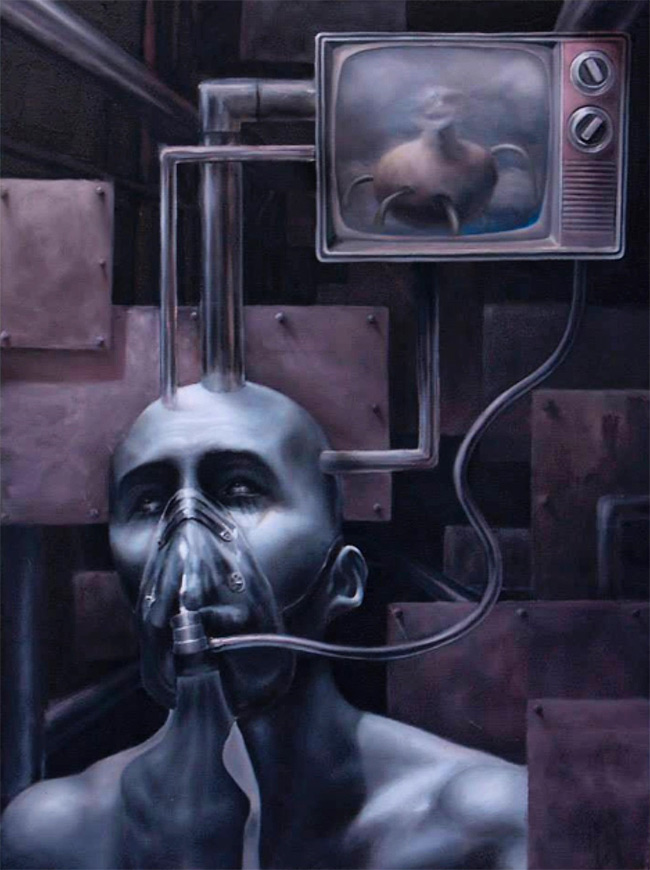
What are your thoughts about Strong AI? Do you believe it is actually achievable?
I can’t think of a reason why artificial general intelligence would be impossible. The thing with the term ‘intelligence’ is that, I think we have a biased definition of what that is. We tend to see the ultimate form of intelligence as relating to our own (Strong AI is simply intelligence that matches the traits of human intelligence). But, we have already built machines that far outmatch our own intelligence in certain faculties. For decades, computers have been making calculations far greater and faster than the human brain could ever dream of. Data can be stored at far greater capacity and recalled with 100% accuracy and detail. The best chess players and Jeopardy! contestants are now computers. It’s just that the human brain is good at certain things (particularly pattern recognition) and bad at other things; and we tend to make machines that are more intelligent in those areas that we are not. That being said, I do however, recognize that there is certainly something special about the human mind, and particularly self-awareness (which could be considered the greatest mystery of the human mind).
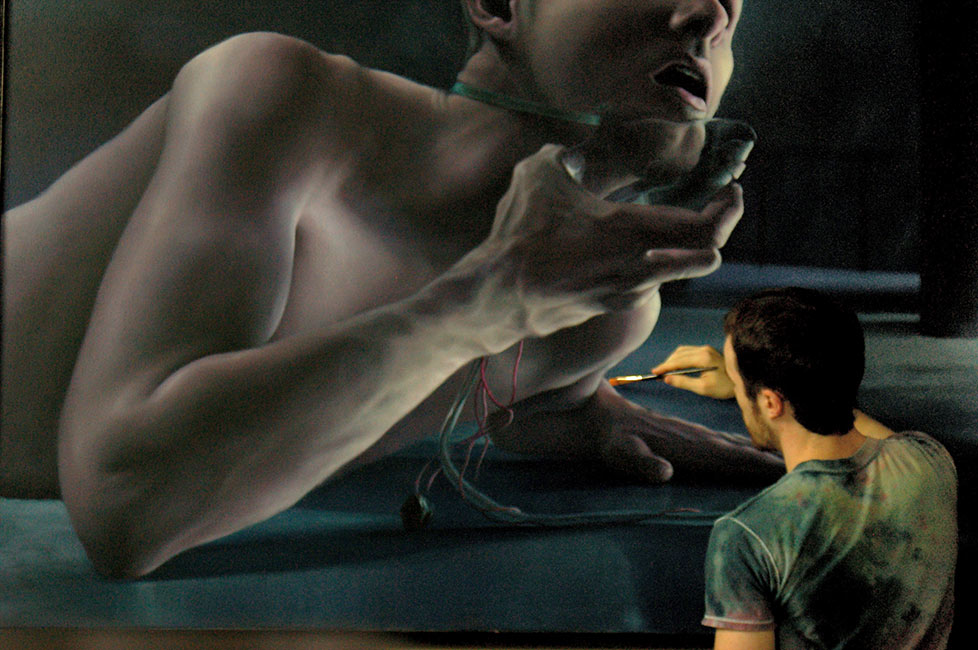
So, could we make an artificial form of consciousness that is self-aware? I’m not sure we know enough about consciousness to really answer this question yet. But, if we accept the premise that the mind is purely material, and our consciousness is an emergent phenomenon of the order and function of that material, I don’t see why it would be impossible to reproduce it in some artificial way. If it is achievable, obviously there are some ethical concerns to all of this, and while I don’t think it is likely that machines would have an arbitrary desire destroy all humans (unless that desire was an aspect of their fundamental programing), I do agree with thinkers like Elon Musk and Sam Harris, that the real concerns come from the unforeseeable potential of a learning computer, with access to the internet and computational power thousands of times greater than our own, and the ability to improve upon itself at an exponential rate. I don’t think the human mind actually has the capacity to understand just how out of hand this could get. It’s a similar concern to that of Stephen Hawking in relation to a human encounter with alien life: if we are faced with an entity that is millions of times smarter than us, we may be viewed in the same way that we view insects or even bacteria. Such a being could wipe us all out, even without malicious intent, in the same way we don’t think twice about committing genocide on bacteria as we clean our counters with bleach. The degree of separation in intelligence is so great that we have virtually no ethical concerns for bacteria.
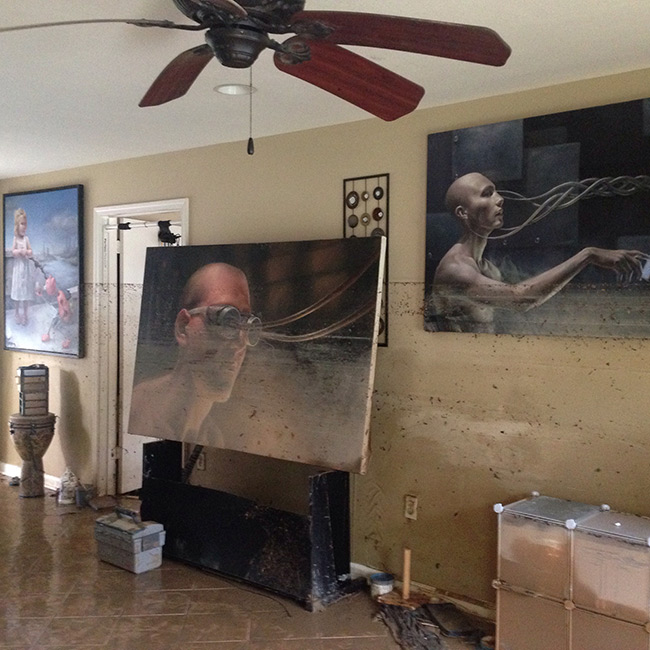
Aside from the doom and gloom potential, it seems like it may also be possible that artificial intelligence won’t be something created so deliberately, but instead be an emergence of our collective consciousness. We are already becoming almost unconsciously obsessed with linking ourselves together and sharing information through the web (much like the activity of neurons). The ‘world wide web’ already resembles a neural network of some sort. What if this connective technology gets integrated into our biology? What if the idea of privacy fully disintegrates, and all of our thoughts and interactions are recorded and shared throughout this all-encompassing network? Many people are already compulsively behaving in this way, and sharing every possible aspect of their lives into this ‘brain’ we call the internet. Is it possible somewhere far along the line, this network itself could exhibit traits resembling consciousness? These are all fascinating questions, but difficult ones to even guess at, at this point in history.
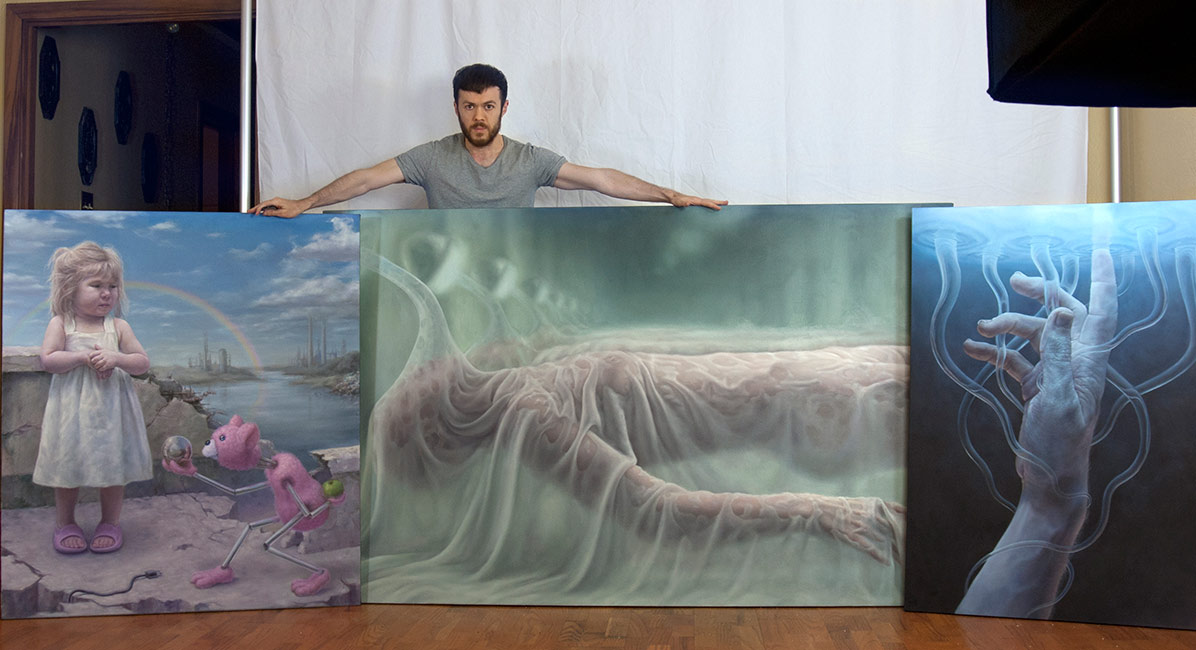
You explore the realms of human imagination with your subject matter. How do you nurture your own imagination?
Imaginative states of mind are plentiful in youth and are difficult to cling on to as you get older and develop, what you think is, a more grounded understanding of reality. It’s important to keep an interest in the vague and mysterious parts of life. Keep asking questions, and acknowledging how much you don’t know about the world around you and the philosophical mysteries of life. I think for many of us, as we become adults, we tend to resist the urge to question ourselves (at least in our model of how the world is). It can be mentally exhausting to constantly question ourselves and our understanding of the world. It can be terrifying to tear down our narrative of reality, stare into the black void, and admit we do not know. Novel ideas come from a place your mind has never been before, so practice taking your mind to those uncharted waters. Practice mindfulness meditation. Try to clear the mind from background noise, embracing solitary moments. It takes work to get into the right head space. You have to try to conjure up novel ideas. Create the right conditions to get a good radio signal to the muse. Random thoughts happen, but you can’t rely on that, and its less likely to happen if you stay distracted with bullshit. It becomes difficult as more distractions and responsibilities infiltrate your life, but that just means it’s going to take effort to nurture imagination. It’s all about making time and making it a casual and consistent habit to get into a creative head space.
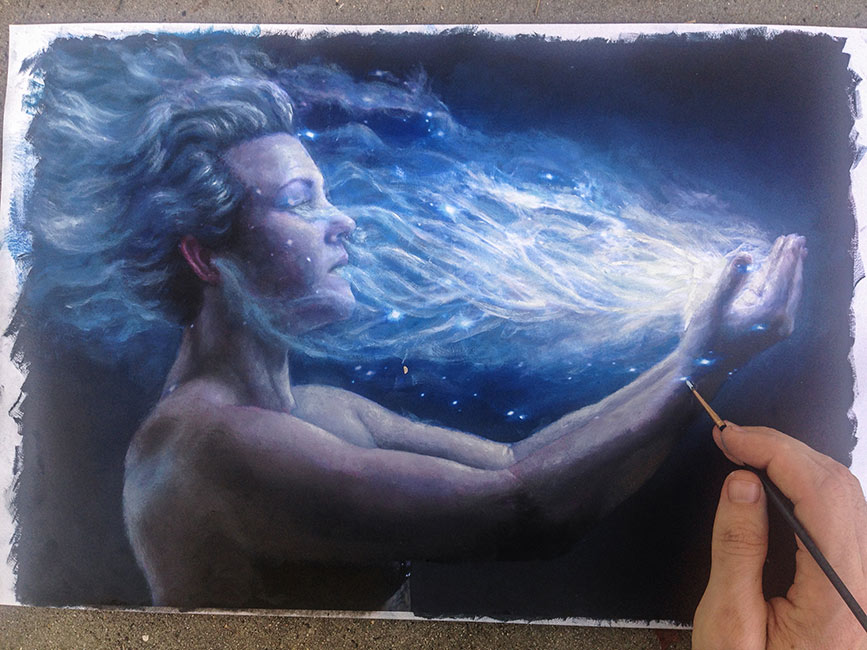
Where does your sense of community stem from as an artist? Do you feel part of a close-knit scene in your home city, or do you connect more with other creatives online? Is community something that is important to you and your creativity?
Sometimes I feel like I’m too cynical to feel part of a community, lol. But that’s not entirely true. It’s fascinating how much the online world has expanded the art community, and there are many artists that I admire and respect from all over the world who can share not just their work, but their process, studio space, and everyday lives. Baton Rouge, Louisiana has a small tight-knit art community. It’s a very friendly and welcoming environment full of great people who are very encouraging. So, I feel fortunate for that. But it’s also great that I can expand my network world wide without being forced to relocate myself immediately to areas that just have a broader art market.
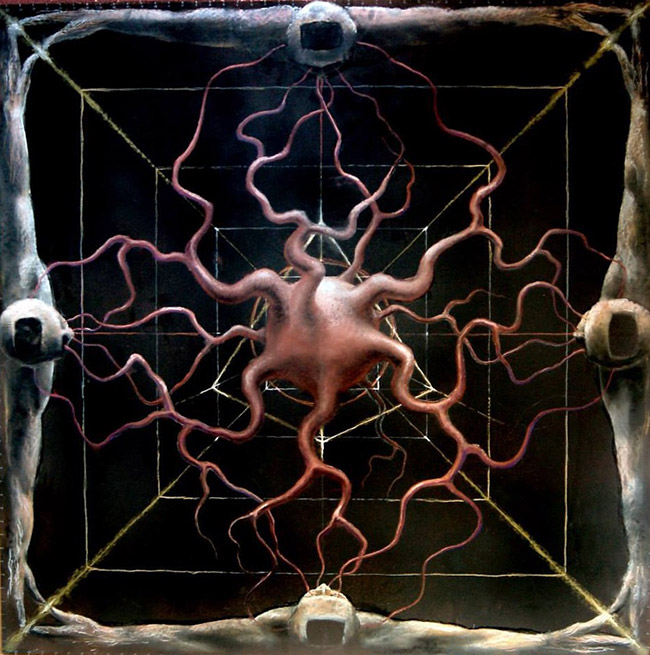
In order to get a better understanding of the personality of an artist, it can help to get a peek behind the curtain. Would you be willing to share a story from your own life, possibly one who’s memory you find yourself returning to for inspiration, or maybe just a tale about a hardship you’ve overcome which has helped define the person and therefore artist that you are now?
It’s hard to pin-point any specific life event that led to artistic inspiration for me, I think mainly because my work is more based on philosophy and less on personal experience. Of course, all of my life events have in some way, collectively, influenced everything that I do, including all of my artistic inspiration. But I guess I have a tendency to separate my ‘self’ from my work, and when I think about it, the only real personal connection I feel towards my artwork comes from the amount of thought and time that I put into making it. Maybe because the landscape of philosophical and artistic thought is so much of a separate domain than the rest of my life that it creates a kind of boundary between myself and what I’m producing artistically. But, that’s not to say personal experience hasn’t influenced what I do, it just probably has in more of an indirect way.
There are a few life events that I can point to that have changed my perspective in a way that may have crossed over into the artistic domain. The move from San Francisco to south Louisiana was a bit of a culture shock, and may have caused me to get wrapped up in my thoughts a lot more than I used to. The introduction to certain types of music may have sparked the general aesthetic I was drawn to and evolved from artistically. Possibly the most perspective-changing event happened in my early twenties when my best friend developed a rare type of cancer. We were planning of going into business together, and my life could have taken a completely different turn. He fought for a while, but the cancer was too aggressive. Watching your best friend, someone your age, waste away like that really makes you confront your own mortality, and truly appreciate the fragility of life, the mystery of death, and all of these things that young adults are rarely confronted with in such a harsh and direct way. Some experiences are hard to overcome, but I maintain that even the most dismal moments have lessons you can draw out of them.
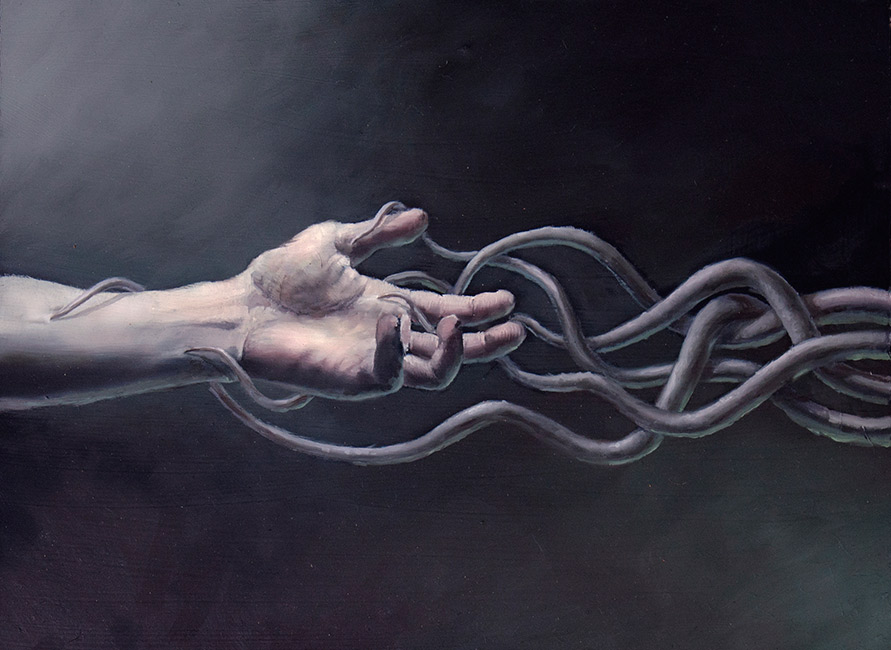
If you could own one piece of art from any of the world’s collections what would it be and why?
I would own ‘Fountain’ by Marcel Duchamp (if it could be found). Not because I necessarily respect the piece, or for any visual or aesthetic reason, but because it is a historical marker for when the very concept of art reached a critical point of absurdity. If art is completely defined by interpretation, and therefore completely subjective, then how does it provide any objective meaning or value? This posed the very real question of what art really is, and why an artist does what they do. To me, the historical concept presented very real questions I should be asking myself: As an artist, why am I doing what I am doing? How will others interpret my work and how can I visually steer the viewer to consider the concepts I am presenting? What makes my work “good” or “valuable” in some way? I think these are important questions all artist should be asking themselves. To me, there seems to be a stain of pretension on the idea of art that rests entirely on open interpretation and subjectivity. There has to be some aesthetic or conceptual justification behind what makes art objectively good. And I think to deny that is to, in some way, do a disservice to our roles as artists. I think this piece reminds us of all of this. Plus, I think its inherently the funniest piece of art to own.
What’s next for Victor LeBlanc?
I am ready to get back into sculpting and using my experience with silicone as a medium. In 2018 I plan on creating a series of silicone-based hyper-realistic sculptures, some paintings around the same theme, and exploring a themed solo show. I don’t want to give away too much, but I have a direction in mind and am eager to get started.
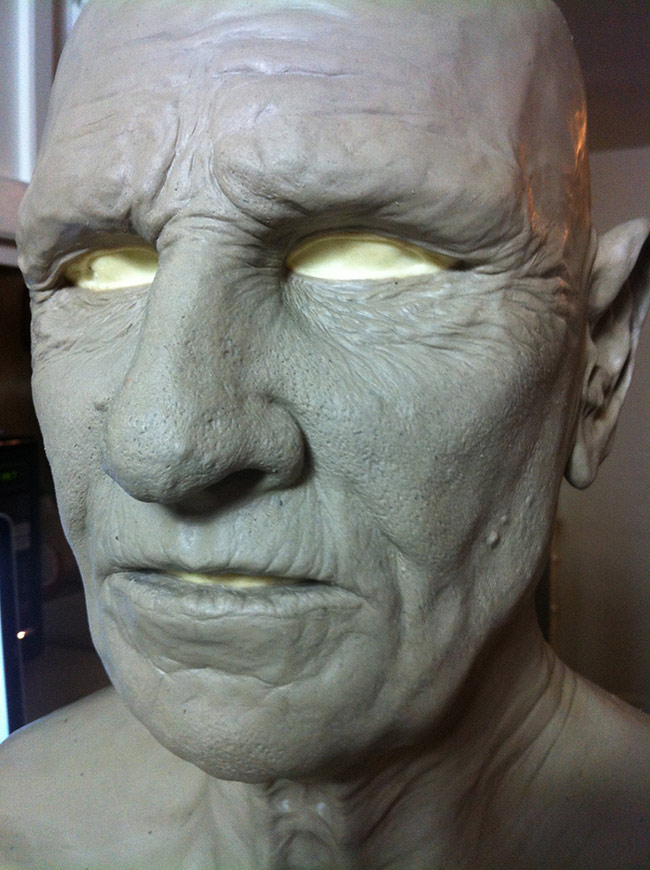
![]()
![]()
![]()
![]()
![]()
